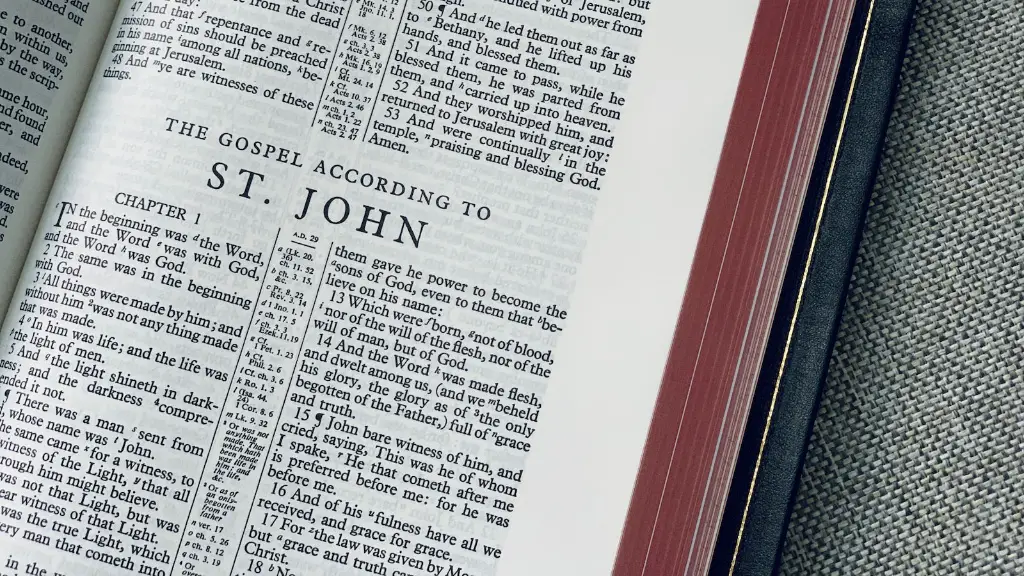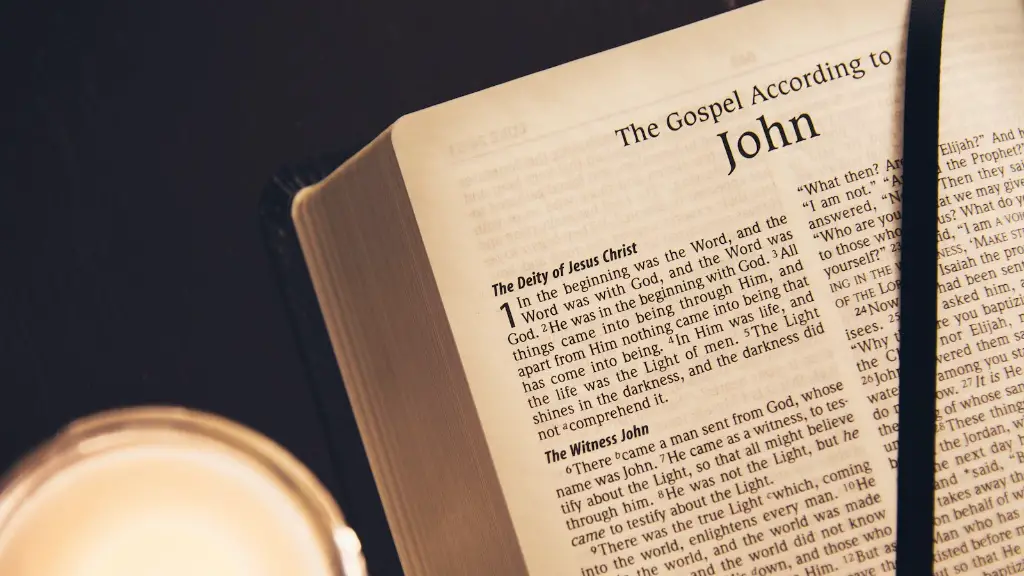Bread is the most important dietary staple for cultures around the world, and its biblical presence is no less profound. From communion loaves to stories of biblical caregivers, bread has played a profoundly significant role in the development of Christianity. To this day, the idea of bread – especially as it relates to the Bible – has multiple layers of symbolism.
One of the most obvious symbols of bread in the Bible is Communion. The Communion wafer is a thin round disk made of unleavened wheat bread. As prescribed in the Bible, it symbolizes the body of Jesus, which was broken during crucifixion. According to Christianity, believers consume the Communion bread and wine to honor Jesus’ sacrifice and to demonstrate their own faith. This symbolic act of communion is performed in churches, representing an unbroken tradition that binds all Christians together.
In addition to Communion, bread is commonly associated with the idea of care in the Bible. One of the most poignant examples of this is the story of Ruth, a Moabite woman who chose to care for her aging mother-in-law after the passing of her husband. Despite the fact that Ruth was a foreign woman, she was accepted in her new community, and she proved the depths of her devotion by providing for her elderly relative. Even though she was a widow, Ruth worked hard in the fields, gleaning barley and wheat to provide for them both. Her incredible selflessness and devotion to her mother-in-law were remarkable, and she eventually found success, becoming the great-grandmother of King David.
Bread is also found in the miraculous moments that occurred throughout the bible. In perhaps the most famous of these, Jesus fed the multitudes with only five loaves of bread and two fish. This feat shows Jesus’ divine power and expansive compassion, demonstrating that no act of generosity and kindness is too small – even a meager offering of lunch can be a miracle in the right hands. This miracle of the loaves, though nearly two thousand years old, is one that remains in people’s hearts and reminds us all of the great power of faith.
Bread in the Bible is associated with more than just miracles and acts of devotion, however. In ancient times, bread could have been considered a symbol of luxury, as it was relatively expensive to produce. Even for those who lived in abject poverty, owning a loaf of bread may have been something to be proud of – a tangible gift from God. The idea of bread as a sign of abundance and prosperity was a pretty common one in those times, and it still influences religious thought today.
The significance of bread in the Bible is not limited to its symbolism, however. Bread is also a reminder of the revolutionary power of agricultural knowledge, as it was one of the first foods to be mass-produced by humans. In some ways, the idea of bread symbolizes the mastery of humankind over its environment – a legacy that is still carried by modern farming techniques.
Finally, bread in the Bible is a reminder of our individual and collective mortality. As it is prone to spoilage and decay, bread serves as a metaphor for the fragility of life. Much like a loaf of bread, our lives can be too quickly snuffed out, and we must be mindful of the things we do and the way we treat each other, for our time is limited.
The Sacredness of Bread
The bread that is consumed throughout the Bible is often seen as a spiritual symbol, and some believers consider it to have an almost-sacred quality. By partaking in communion and other religious ceremonies, people are not just paying tribute to their faith – they are celebrating the miracle of bread itself. Bread has been a part of human culture since the beginning of civilization, and this significance is echoed in its repeated presence throughout the Bible.
The bread that is mentioned in the Bible is most often wheat bread, a hearty grain-based product that is still a dietary staple in many countries today. Some scholars believe that its combination of simplicity, affordability, and nutrition made wheat bread the ideal choice for various breads mentioned in the Bible. Whether it is the bread of sacrifice, communion, or sustenance, its symbolism is something that links us with generations past and gives our faith renewed meaning.
Commemoration Through Bread
In addition to the physical consumption of bread, its presence in Christian ceremonies is a reminder of the importance of commemoration. By reflecting upon the tales of bread and the power of its symbolism, we are able to take a step back from the hustle and bustle of our daily lives and take time to commemorate the powerful sacrificial offerings of our faith. Each time we break bread with others, we remember the stories that have been carried throughout the centuries and the strength of will, devotion, and faith that was required to live a life true to the Bible.
During religious ceremonies, the breaking of bread is a ritual that is seen as a spiritual re-enactment of the original tale. In individual households, it is a powerful reminder of the power of unity and charity, as well as the faith we have that, despite overwhelming odds, it is possible to find solace and strength amongst difficulty.
Commemoration also offers an enduring reminder of the political dynamics at play in ancient times. Bread was often used as a means of sustaining the power of rulers or marking out of spiritual differences between groups of people. This idea may sound unfamiliar today, but the concepts of hierarchy and privilege remain as they were while bread still has an important role in commemorating these experiences.
Lack of Bread in the Bible
The lack of bread in the Bible is not necessarily surprising, as it is usually the most basic of all food items and, therefore, does not evoke the same sense of awe and wonder that other substances such as honey or fine spices may. Nevertheless, despite its lack of emphasis in Scripture, bread is a key symbol of faith and devotion in many religions, and it should not be taken for granted or overlooked in our efforts to gain a deeper understanding of biblical spirituality.
Furthermore, the lack of attention paid to bread in the Bible does not mean that it is of little value. Indeed, there are many passages that use bread as a metaphor for worldly consumption and the dangers of greed. At its core, bread is an example of something that can be shared, a representation of the world’s bounty and the potential for harmony and peace, even in the face of great adversity. As a reminder of this, many Christians take Communion wafers as a sign of their commitment to the divine and to the lives of others.
The Presence of Bread Today
Today, bread remains as prevalent as ever in our culture. In many countries around the world, some form of wheat-based bread is eaten at almost every meal. From cakes to pancakes to loaves of French bread, bread continues to play a major role in the meals of many cultures.
Breads of various shapes and sizes can also be found in many religions and houses of worship. In the modern world, Communion wafers are no longer made of pure wheat dough – many churches serve communion that is specially-crafted to resist deterioration and retain its pure flavor for up to a year. Nevertheless, the symbolism of breaking bread remains a strong part of our spiritual practices.
Biblical Parallels With Modern Life
In recent years, bread has become a symbol of the idea of unity and hope in the face of adversity. Just as the people behind the Bible-era stories of bread never gave up – even when faced with poverty and famine – modern-day leaders, activists, and citizens continue to strive for change and progress. Just like bread, these ongoing efforts to fight for justice and improve our world can be a source of hope, sustenance, and renewal.
The presence of bread in the Bible has long been a reminder of our shared mortality, the abundance of divine love, and the revolutionary power of bread-making. In that same thread, many people today look to bread as a symbol of collectivity and inclusion – a small reminder that change and improvement are always possible.
Final Thoughts
The timelessness of bread in the Bible is a testimony to its symbolism. From Communion wafers to miraculous stories of sustenance, bread has been a part of human culture since time immemorial, and its presence throughout the Bible provides us with invaluable lessons and insight into our beliefs, our faith, and our relationship with the world around us. It is up to us to take these reminders and to use them in an effort to better our lives and the lives of those around us.




